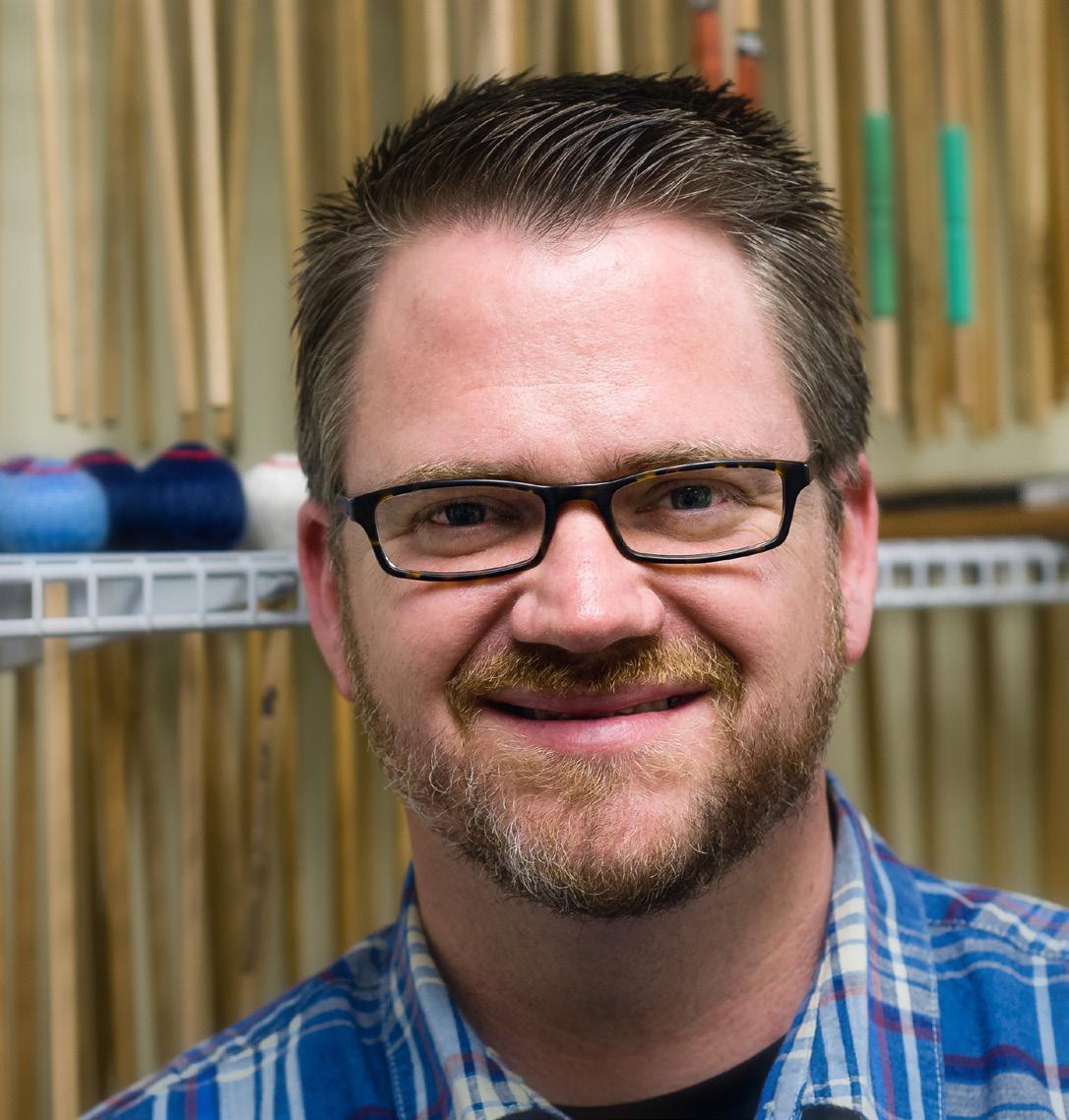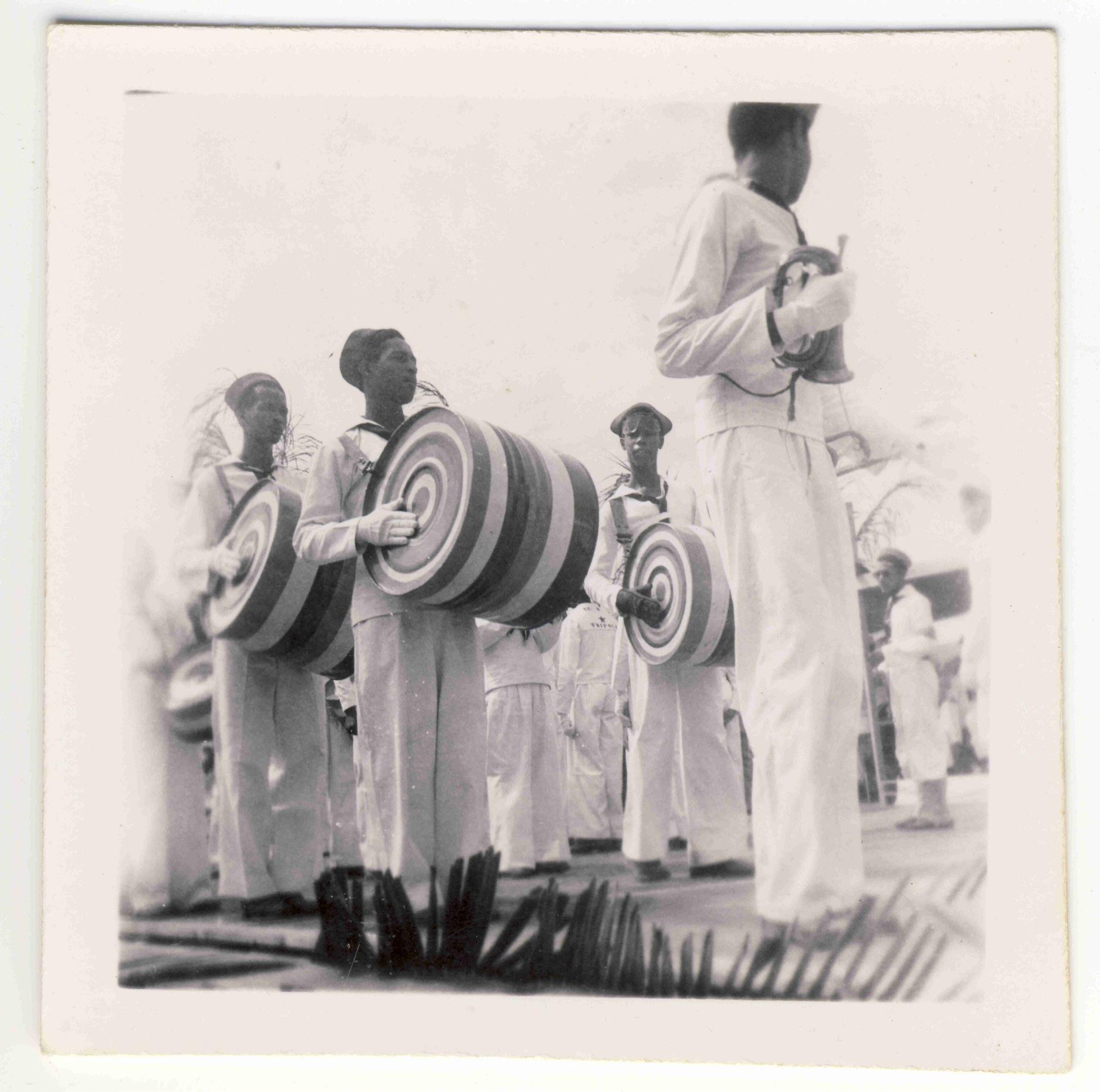
23 minute read
HUGH BORDE & THE TRINIDAD TRIPOLI STEEL BAND
Ray Funk & Andrew Martin
Until his passing in February of 2020, Hugh Borde—a legendary steelpan pioneer—was best known in Trinidad for his 35 years of judging Panorama competitions. Despite living in the United States for over 50 years, Borde returned home to Trinidad every year for Carnival. Borde relished the opportunity to see old friends, judge Panorama steelband competitions, and host an annual Carnival Thursday lime in Belmont known for celebrating steelpan pioneers. But few people realize Borde’s key role in leading one of Trinidad’s great steelbands, Trinidad Tripoli. Much of the band’s history was relegated to time until March of 2003, when National Public Radio’s All Things Considered, aired a piece titled Liberace & the Trinidad Tripoli Steelband which described the tale of how oil and one of America’s most flamboyant entertainers helped millions of Americans hear one of Trinidad’s hottest steelbands during late 1960s and early 1970s. The story of Hugh Borde and Tripoli steel orchestra, like any of the great Trinidadian panman and steelbands, is a fascinating tome full of twists and turns.
Advertisement
Hugh Borde grew up in the St. James neighborhood of Port of Spain. Borde’s mother was a musician and organist at St. Mary’s Roman Catholic Church and was one of the first to get a piano in St. James. He started learning piano at the age of five and unlike many pannists of his era was trained in western art music theory and harmony by his mother. “He was musically literate and could translate the classics using sheet music,” noted Borde’s longtime friend Cliff Alexis who would later add, “this was one of the things that made him special—he could run in both worlds of panman and other musicians.” His musical training notwithstanding, however, it was steelpan that interested Hugh and his older brother Carl the most and the pair spent most of their available time in the panyard. Borde’s parents were against any member of the family getting involved with steelband. Carlton “Sonny” Roach was an early steelpan influence, and Borde notes, “Sonny came by my window of my house. He would listen to me on the piano and try to bang out the right notes.” Borde’s mother discouraged the whole affair by tossing a bucket of water on Roach, “She just wet him down!” he recalled. Borde’s father, too, discouraged the boys from playing steelpan, even once going on a rampage with a hatchet (Right) Tripoli’s The Surrender of Japan on the Western Main Road in St. James, 1961.

St. James and Tripoli
(Left) Tripoli Bugle and destroying all the steelpans rehearsing in their panyard. But Hugh and Carl were smitten with the instrument and devoted their lives to steelpan.
The St. James area had only a few steelbands in the 1940s and 1950s, and Borde started off in Hell’s Kitchen, a group of youngsters that included future steelband legend Sterling Bettancourt. It was here that Borde received his nickname “Boboy”. He then played with a band called Five Graves to Cairo before he joined a band that was initially called Grow More Food. Then, like many steelbands of the time, the band took on a name from a movie title, Shores of Tripoli (1942) taken from the US Marines hymn, “From the Halls of Montezuma to the Shores of Tripoli”. Joseph “Crick” Christopher was the band’s leader. Inspired by the military theme, Crick demanded that he be addressed as “Admiral,” saluted by band members, and Tripoli played the Marines hymn for Carnival parades.
The military theme was carried into the mas band that Tripoli brought out every Carnival. “We won for military mas nine years straight,” Borde recalled. Tripoli kept to sailor
mas during Crick’s leadership and carried on the tradition when Borde was appointed leader of the band in 1951. Band member Clyde Yorke further notes that Tripoli always played American sailors, never British sailors. The band’s panyard moved around during these early years but eventually settled on the corner of Ethel Street and Mucurapo Road in St. James. Tripoli performed in the famous first island-wide steelband competition held in September of 1946 at Mucurapo Boxing Stadium, and the band was successful in competitions during this time period, garnering strong public support across the island in the 1940s and 1950s. Tripoli also played regular spots on Radio Trinidad and was well supported during Carnival by massive mas bands year after year.
Crick left the band in 1951 and Borde became its captain and would continue as its leader the rest of his life. Steelband was Borde’s passion, but initially not his vocation. After attempting to become a horse racing jockey, Borde went to work as an accounting clerk for the Ministry of Works, a job he held until the late 1960s. Tripoli was his primary focus, however, and Borde’s frequent travels finally caused him to quit his day job to focus exclusively on steelpan.
Borde was a devotee of traditional calypso, and classics from the likes of Sparrow and Kitchener were a staple of the band’s repertoire. “He had a keen ear for melody, which made him such a great arranger,” notes Hollis Liverpool. In the early 1950s when Borde first took over Tripoli, the stage side often backed calypsonians like Tiger, Skipper, and Panther in nightclubs such as Dirty Jim’s Swizzle Club on South Quay. Tripoli also backed limbo acts including Stretch Cox. Tripoli was also on the forefront of innovations to steelpan playing, notes Kim Johnson, who indicates that, “as early as 1956 [Tripoli took] the first amplified pans on the road.”
By the early 1960s, Tripoli was coming into its own under Borde’s leadership as one of the leading steelbands in Trinidad. When Panorama and the steelband festivals began in the early 1960s, Tripoli was in the top ranks of both competitions. Junior Pouchet of Silver Stars who, though never a member of Tripoli, was a close friend of Borde and arranged for Tripoli. In 1964 and 1965, Tripoli won acclaim during the Steelband Festival for his arrangements of “The Man I Love” and “Midnight in Moscow”. Winning the Prime Minister’s trophy at the Steelband Festival earned Tripoli the privilege Another force in the rise of Tripoli was Father John Sewell, an Anglican minister who came to Trinidad in 1963 and was based at various churches throughout the country. Sewell was an instant supporter of steelbands and, shortly after arriving to Trinidad, began inviting steelbands such as Tripoli into the church for concerts. Sewell also arranged classical pieces for the steelband and Tripoli performed a classical concert featuring the late Pat Bishop singing classical music backed by Tripoli in a production called Carols and Classics in Steel in Queen’s Hall. According to Bishop, “I was to be the singer and Esso Tripoli, led by Hugh Borde, was the band…I had no mic and the band did not drown the voice and so one more small piece of pan history was made.” Sewell’s work with Tripoli caught the eye of one of Trinidad’s leading classical composers, the late Vernon Evans, and the pair collaborated on several classical music projects. The first was “Dengue—Theme and Variations for Steelband” and the second “Ballet to Steel,” the first time a ballet was accompanied by a steelband. In late years, Sewell took a leave of absence from the Anglican Church and became the Tripoli’s arranger and conductor for classical material, accompanying the band on tours to the United States. Courtney Leiba notes, “Father Sewell never preached religion to us but was excited by the musical ability of the steelband.”
Because of its longevity, Tripoli used a number of tuners over the years. The most notable tuner of the band’s early years was Alan Gervais who start tuning for Tripoli in 1964. Borde and Critchlow were excited to have Gervais to join the band, saying he was “Dynamite.” Gervais pioneered many tuning methods, giving Tripoli a unique sound. He also performed with the band in the Engine Room when they went on tour to the United States and Canada. Borde was enthusiastic in his praise, “When [Gervais] tuned a pan it would be so good, you could play them with broomsticks and they wouldn’t go out of tune. He was way ahead of his time.”
Esso Oil Sponsorship
Throughout the ongoing history of Trinidadian steelbands one of the most important ingredients for a steelband’s success, especially from the 1950s on, was sponsorship. While sponsorship of steelbands is now quite common, it was not in the 1950s. The oil industry in Trinidad was a leader in this area with Shell sponsoring Invaders and other companies such as Texaco and Amoco sponsoring steelbands. Esso was one of the first companies to sponsor steelbands when they sponsored the Woodbrook steelband Dixie Stars on a 1954 tour to Canada. The band, led by Hugh Borde’s brother Carl, eventually moved to Bermuda where they stayed and worked for decades as the Esso Steel Band. Sponsorship
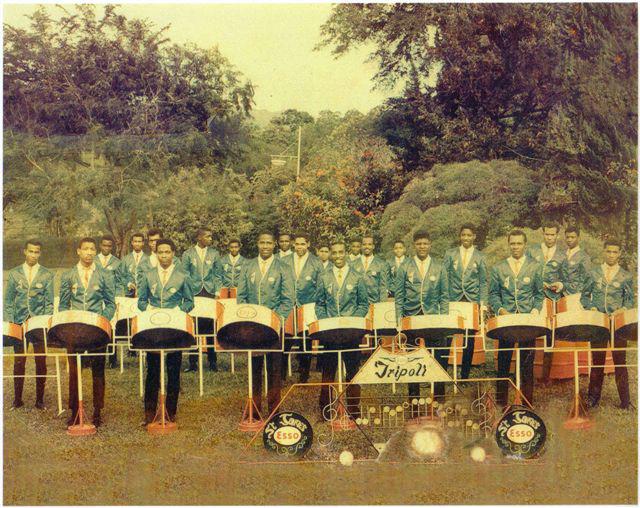
enabled bands to get needed publicity and it gave essential financial support for equipment, panyards, arrangers, and tuners. Esso began sponsoring Tripoli shortly after the band won the Prime Minister Trophy in 1964. Esso remained the band’s major sponsor until 1967. Both Shell Oil and Elna Sewing Machine had both previously sponsored Tripoli for brief periods, however, their support was nothing compared to the ongoing relationship that developed with Esso. Fred Lam worked in marketing for Esso in the 1960s and chose Tripoli for sponsorship after interviewing a number of steelbands. He became a prime force in promoting Tripoli on tours in the Caribbean, United States, and Canada. Tours involved various versions of Tripoli ranging from Borde solo to the full band. Esso often sent Borde and Critchlow on trips throughout the Caribbean to teach and build steelpans for local steelbands. Tripoli at the Botanical Gardens, winners of the 1965 Indepencence
Festival.
The National Steelband
Because of his work with Tripoli, Borde’s individual steelpan notoriety rose throughout the early 1960s and he was selected to be a member of the first two editions of the National Steel Orchestra of Trinidad and Tobago (NSOTT). In 1964, this all-star band comprised of representatives from Trinidad and Tobago’s leading steelbands was formed for a tour to Mackinac Island in Michigan for an international conference sponsored by the Moral Re-Armament Association (MRA). The NSOTT was a huge success and in addition to the conference the band toured across the United States from West Virginia to New Mexico. The MRA released a short film of the band called Steelband Varietie.
In 1965, Borde was again chosen to be a member of the NSOTT and this time it was for a tour to the United Kingdom to perform at the Commonwealth Arts Festival. The band, along with a theatrical company, were again popular with The Trinidad Daily Mirror proclaiming, “The Steel Orchestra
was the greatest thing that ever happened to music in recent years. This was the view of music experts in England!” The NSOTT performed at Royal Albert Hall with the Queen in attendance and toured Scotland, Ireland, and Wales. These international tours with the NSOTT had a profound effect on Borde. He became focused on touring internationally with Tripoli and he would not have to wait long as his chance came in 1967.
Montreal’s Expo 67
The 1967 World’s Fair (AKA Expo 67) was held in Montreal and Trinidad made a major commitment to celebrate five years of Independence by creating a pavilion at Expo 67 with daily Carnival events with dancers, musicians and a resident steelband—to be known as the Exponians. The Trinidad pavilion also hosted other touring Trinidadian steelbands including Tripoli. Expo 67 was one of the most successful World’s Fair ever held with daily attendance in the hundreds of thousands, assuring vast exposure for the participating steelbands.
Before arriving in Montreal, Esso marketer Frank Lam with Rock Johnson arranged for Tripoli to go on an extended summer tour up the Caribbean, on to the United States and Canada. Tripoli left Trinidad on the S. S. Federal Maple and sailed north, performing at nearly every island in the Caribbean including Narrows Island, Grenada, Dominica, Antigua, St. Lucia, and Jamaica. Then Tripoli flew from Kingston to New York City where they performed at Lincoln Center, Central Park, Rockefeller Plaza, and the Aztec Garden at the Pan-American Union, before catching a bus and heading down to Washington, D.C. to perform for another week. Tripoli then flew to Canada and spent one month in Montreal, two weeks in Toronto, and two short stops in Ottawa.
The band’s three weeks of performances at the Trinidad and Tobago/Grenada Pavilion at Expo 67 was the highlight of the trip. These performances were in front of crowds numbering in the thousands and it gave the band incredible exposure. Tripoli performed on a small circular stage that was positioned in a moot. This outdoor stage was precarious to say the least and their “scratcher man” Courtney Lieba fell into the water while performing, much to the amusement of the crowd. As Courtney Leiba recalled, “Being a true showman I swam backwards while playing the guiro. This turned out to be a crowd pleaser and Expo 67 officials asked me to perform this feat everyday thereafter.” For most members of Tripoli, the summer 1967 tour to the United States and Canada was incredibly exciting, and Michael Kernahan was particularly struck by the overwhelming audience reception, “People were still not used to the instrument and they got so excited night after night, it was overwhelming!”
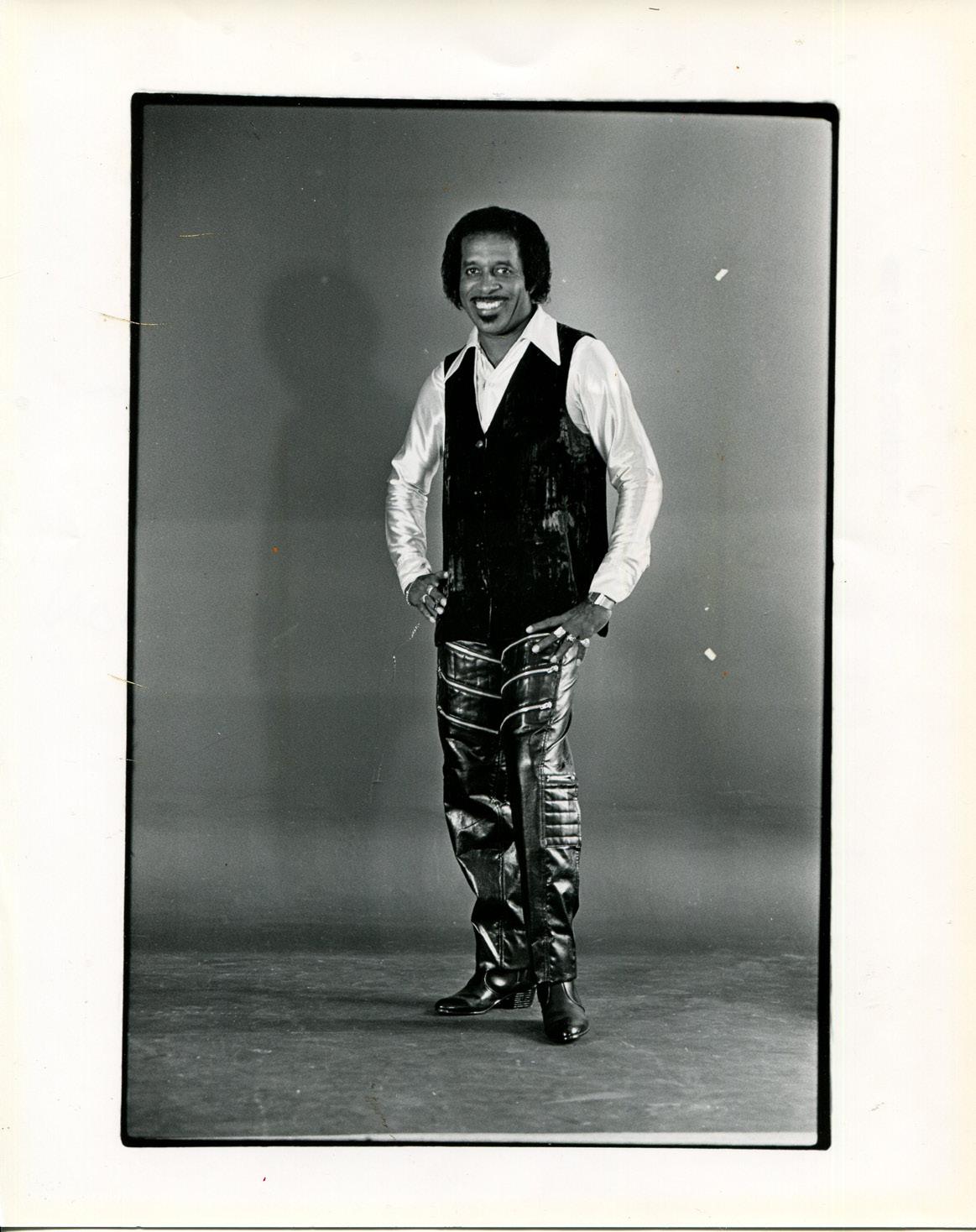
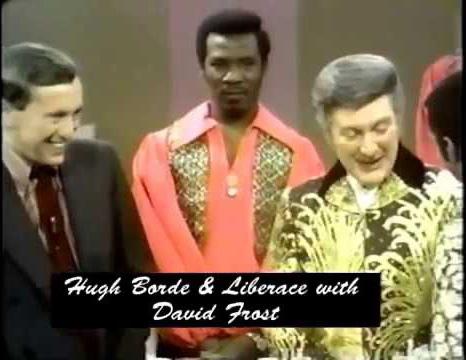
(Top) Hugh Borde, (Bottom) David Frost, Hugh Borde, and Liberace. (Next Page) Trinidad Tripoli Steel Band
In addition to their performances at Expo 67, Tripoli was active playing throughout Montreal, including the Place Ville Marie and galas at the Museum of Fine Arts. In Toronto, Tripoli had the distinction of playing on the road for one of the first Caribana celebrations.
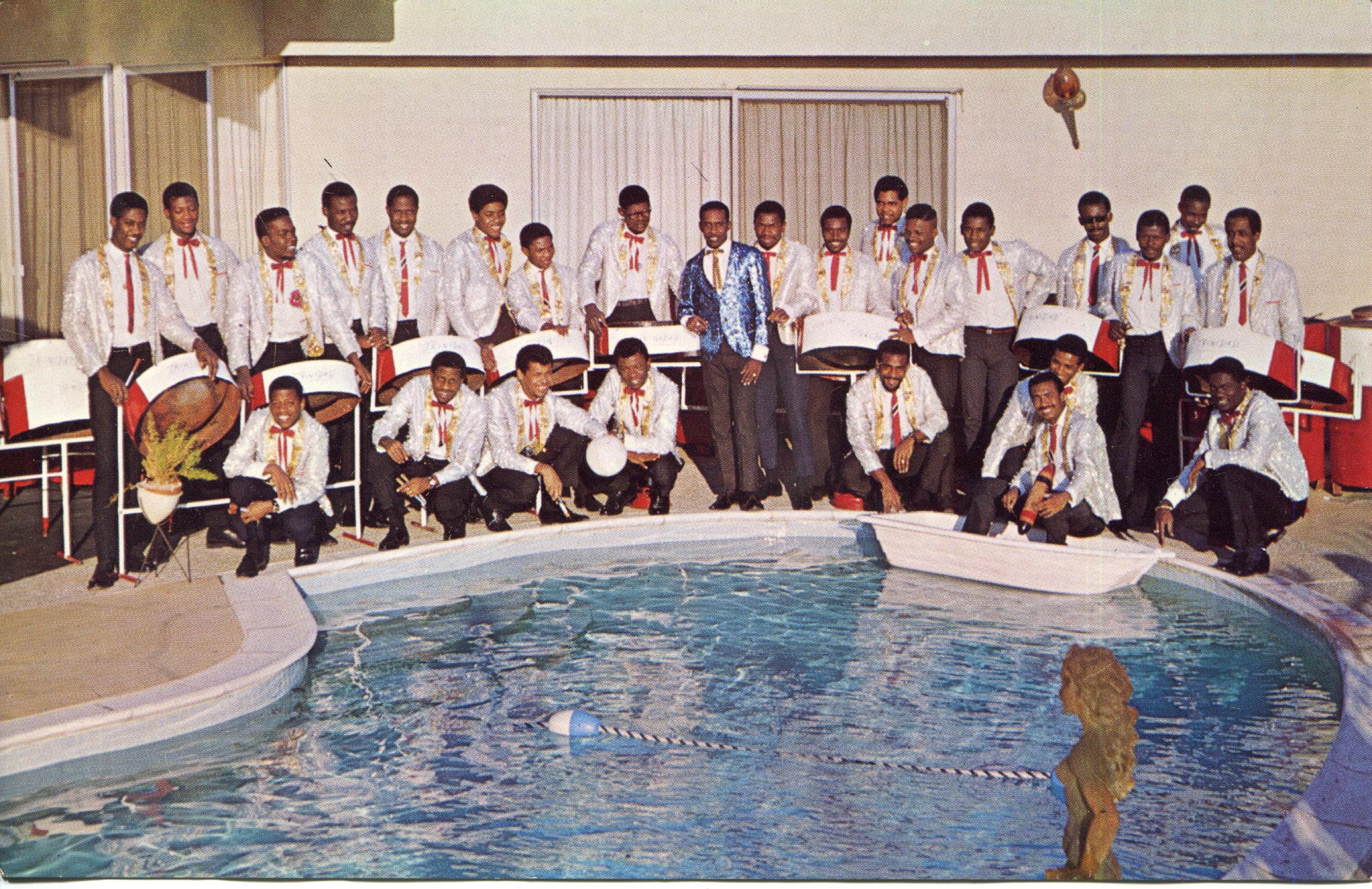
Liberace
With Carnival season upon them in 1968, Tripoli performed for Panorama for the last time, featuring Lord Kitchener’s “Miss Tourist” arranged by Tommy Crichlow. But Crichlow did not come with the band when Tripoli returned to North America on another summer tour of the United States and Canada in 1968. The festival site of Expo 67 in Montreal became a summer attraction known as Man and his World and Tripoli returned to perform at the festival as well as record several studio albums for Arc Records in Toronto.
Fate struck as a result of their work in Canada as Tripoli caught the attention of famed pianist and entertainer Liberace. The flamboyant showman was fascinated by the steelpan’s exotic sound and visual appeal. Courtney Leiba recalls that Liberace’s personal manager Seymour Heller first thought there was some type of gadget under the instruments making the sound. Liberace and his manager start arranging to add Tripoli to his traveling show.
In 1968, the band performed in Montreal and Toronto before embarking on a tour of colleges in New York State. Tripoli purchased a bus and drove to Los Angeles arriving a few weeks before Christmas. Early in 1969, Tripoli performed with Liberace at the Shrine Auditorium in Los Angeles. The show was a success and so began the partnership between Liberace and Tripoli, lasting over two years of tours and traveling 46 states. Tripoli was based in Los Angeles during
this time and played at many of the largest concert halls and nightclubs in the United States, with extended residencies in Las Vegas in between tours. They were a large steelband during this time, traveling with over 20 players.
Liberace gleefully introduced Tripoli as an opening act to his show, and would later perform two numbers with Tripoli, “Alley Cat” and “Twelfth Street Rag” as part of his own portion of the show. Liberace often commented that Tripoli was “the first touring act I’ve seen receive a standing ovation at every performance.” Tripoli also performed on almost every major television variety show during this time, including the Ed Sullivan Show, Tonight Show with Johnny Carson, the Mike Douglas Show, the David Frost Show and the Merv Griffin Show, often with Liberace. For many North Americans, the Tripoli/Liberace tours and television appearances were their first major exposure to steelbands and steelpans. Borde stood out especially on television as he, like Liberace, was known as an impeccably sharp dresser.
Warner Brothers and Van Dyke Parks
While Liberace brought Tripoli to the attention of the international public, the band also caught the attention of Warner Brothers recording artist and producer Van Dyke Parks who had previously worked with Trinidadian-now Los Angeles-based pannist Andrew “Pan” De La Bastide. A wunderkind song writer, lyricist, arranger and producer, Parks was best known for his work with Brian Wilson of the Beach Boys, co-writing several classic songs including “Heroes And Villains” as well as working with artists such as Ry Cooder and Randy Newman on some of their first recordings. Parks signed to Warner Brothers both as a recording artist and producer, and was already a fan of calypso, steelband, and Trinidad before meeting Tripoli. Borde was still under contract to Arc Records in Canada and he and the band decided to part ways. They changed their name to Esso Steel Band and Kenrick Headley became the head of the band.
Parks produced an exciting album titled Esso Trinidad Steel Band (1971) with arrangements by Kenrick Headley and Father Sewell. Parks mixed the sound of the band with several other instruments for an eclectic mix of styles and genres, including the Kinks hit “Ape Man,” Simon and Garfunkel’s “Cecilia,” and the Jackson 5’s “I Want You Back.” Parks considers Tripoli, “the greatest group I’ve ever had the privilege to produce.” Warner Bros. 1971 release of “Esso Trinidad Steel Band” and the realted singles
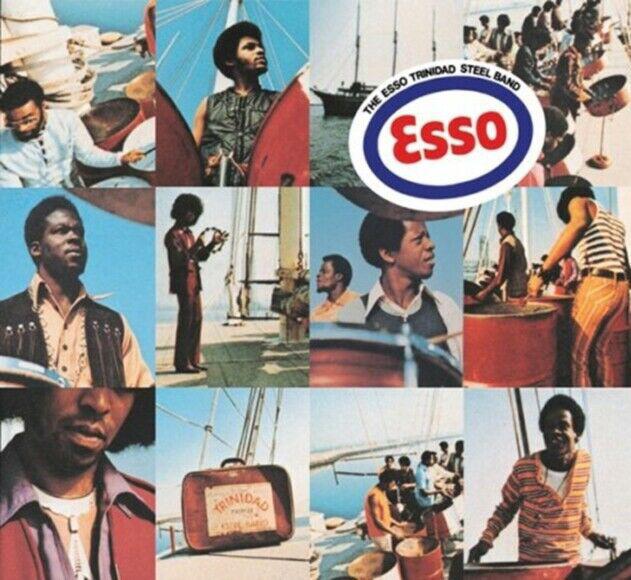

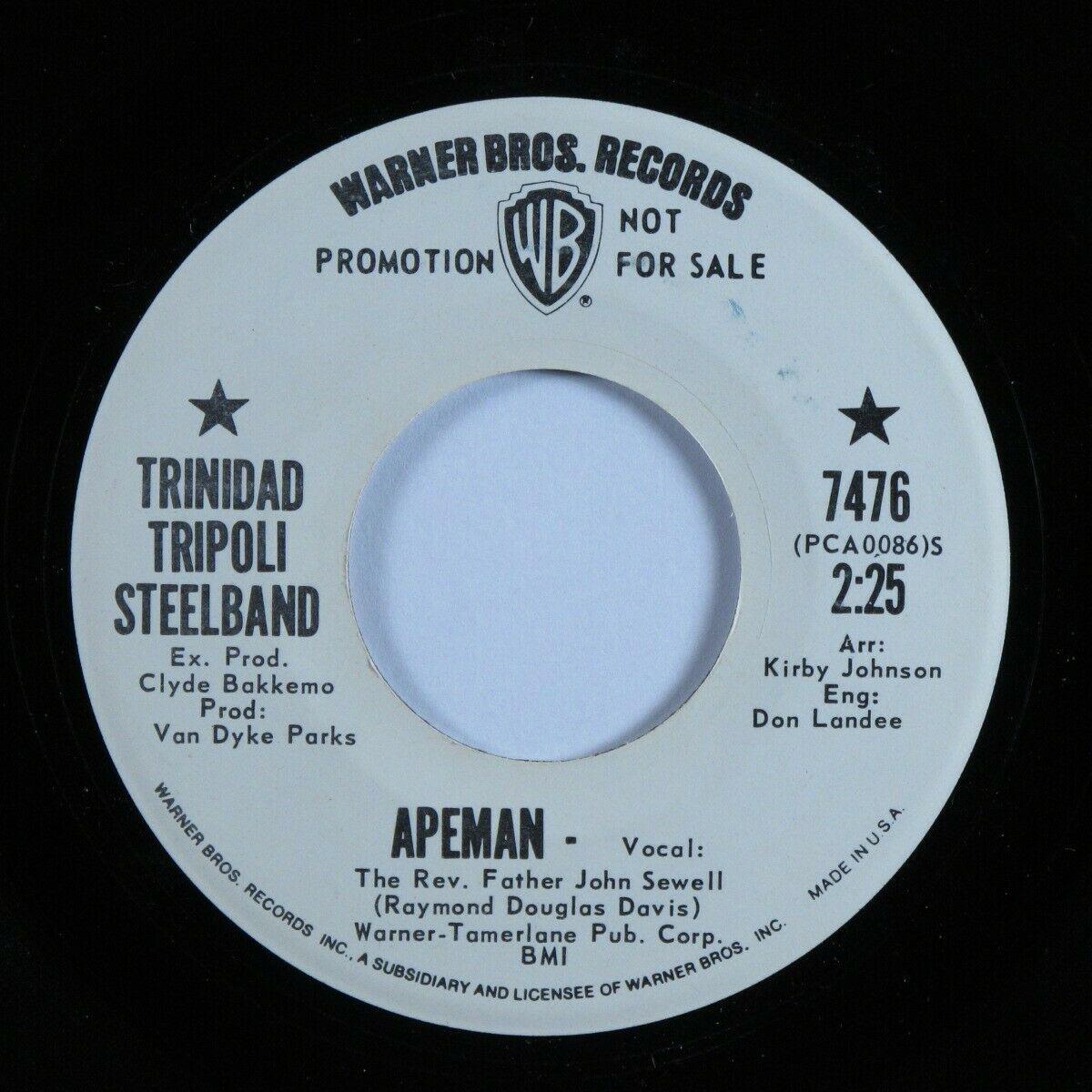
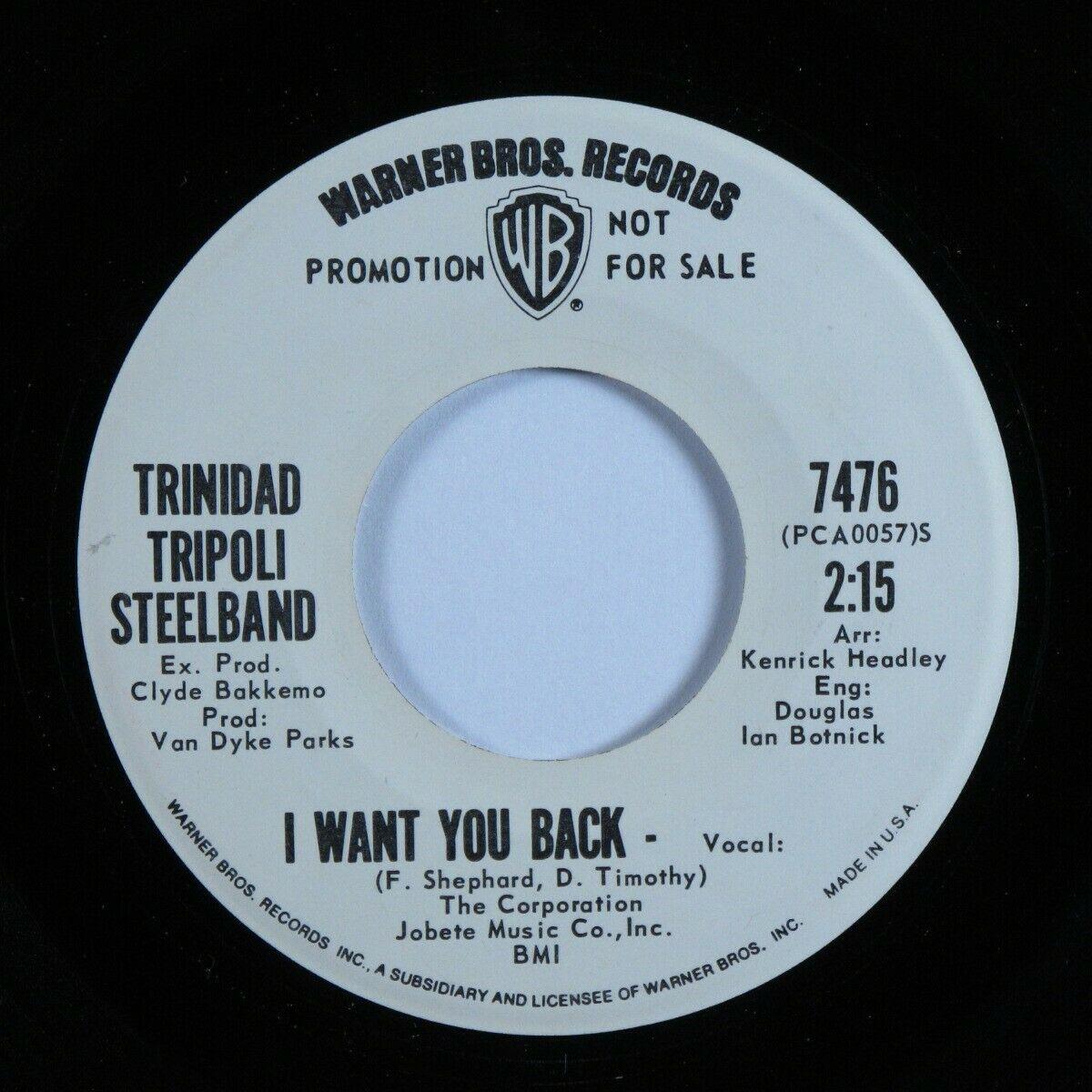
Despite his enthusiasm, Parks had a hard time convincing Warner Brothers to record the album as it did not project significant sales. Parks even went so far as to produce a four-page set of note titled The Guardian of Stateside Steelbands rich with photos and odd pieces of information on Tripoli. Warner Brothers balked at the costly liner notes—which were never printed—but agreed to the album which rewarded the label with a 1971 Grammy nomination for best ethnic or traditional recording —the first in history for a steelband and Warner released three singles from the album.
In addition to producing Tripoli’s album, Parks featured the band’s tracks on his own album, Discover America (1972). Despite its title, the album has more to do with Trinidad than the United States, and features classic calypsos by Kitchener, Sparrow, and Roaring Lion. Tripoli would also perform on another Warner Brothers recording, John Sebastian’s Four of Us album. Because of their work with Parks, the band garnered interest from the rock world and in 1971 the band performed concerts with leading rock artists the likes of the Allman Brothers Band, Hot Tuna, Ry Cooder, Little Feat, and others. British folk-rock legend Richard Thompson saw the band in 1971 and recalled, “Esso Steel Band [was] a big sponsored steel band that did “River Deep, Mountain High” and Bach and stuff.”
The Liberace/Parks period found Tripoli reaching a large new audience of young listeners; yet, the momentum did not last. A tour bus crash in Philadelphia in late 1971 injured several band members. Van Dyke Parks produced a documentary of Tripoli’s tour, though it was not released until several decades later. Meanwhile, the H-1 visas of all the Tripoli members were expiring and in March 1972, the California based members of the band returned to Trinidad and this band dissolved. The St. James Tripolians, a single pan band, grew out of some returning members.
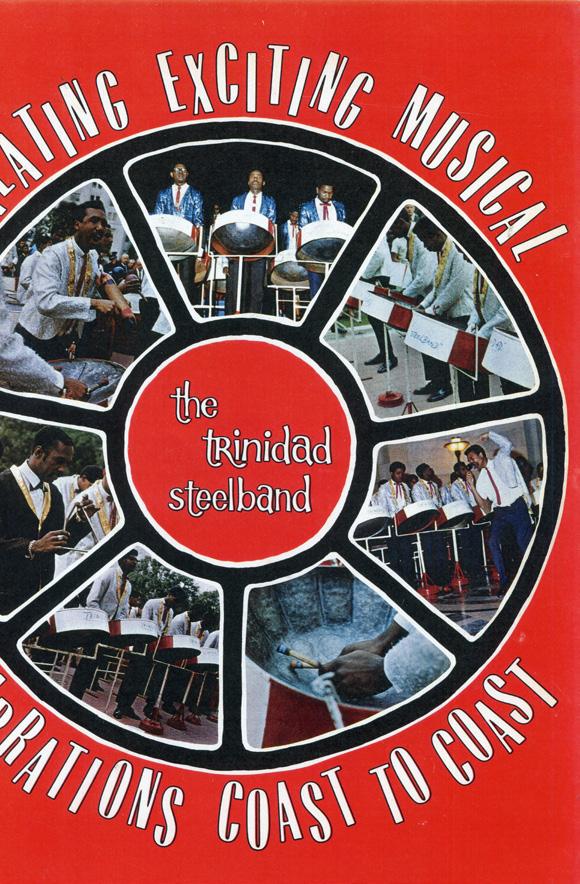
Tripoli—The Borde Family Band
Despite his lack of involvement with the Esso/Van Dyke Parks recording sessions, Borde put together a new band from other Trinidadian steelpan players already in the United States. Tripoli rose from the ashes and the new membership sported an impressive pedigree, including players from Hylanders, Desperados, Casablanca, All Stars, and many others. Players such as Kim Loy Wong, Lennox Phillips, Mike Enoch, Sonny Applewhite, Nick Gilford, Donald Baptiste, Wilton DuBois and Jim Boyce joined Borde as Tripoli members. With Borde at the helm, there was attention to
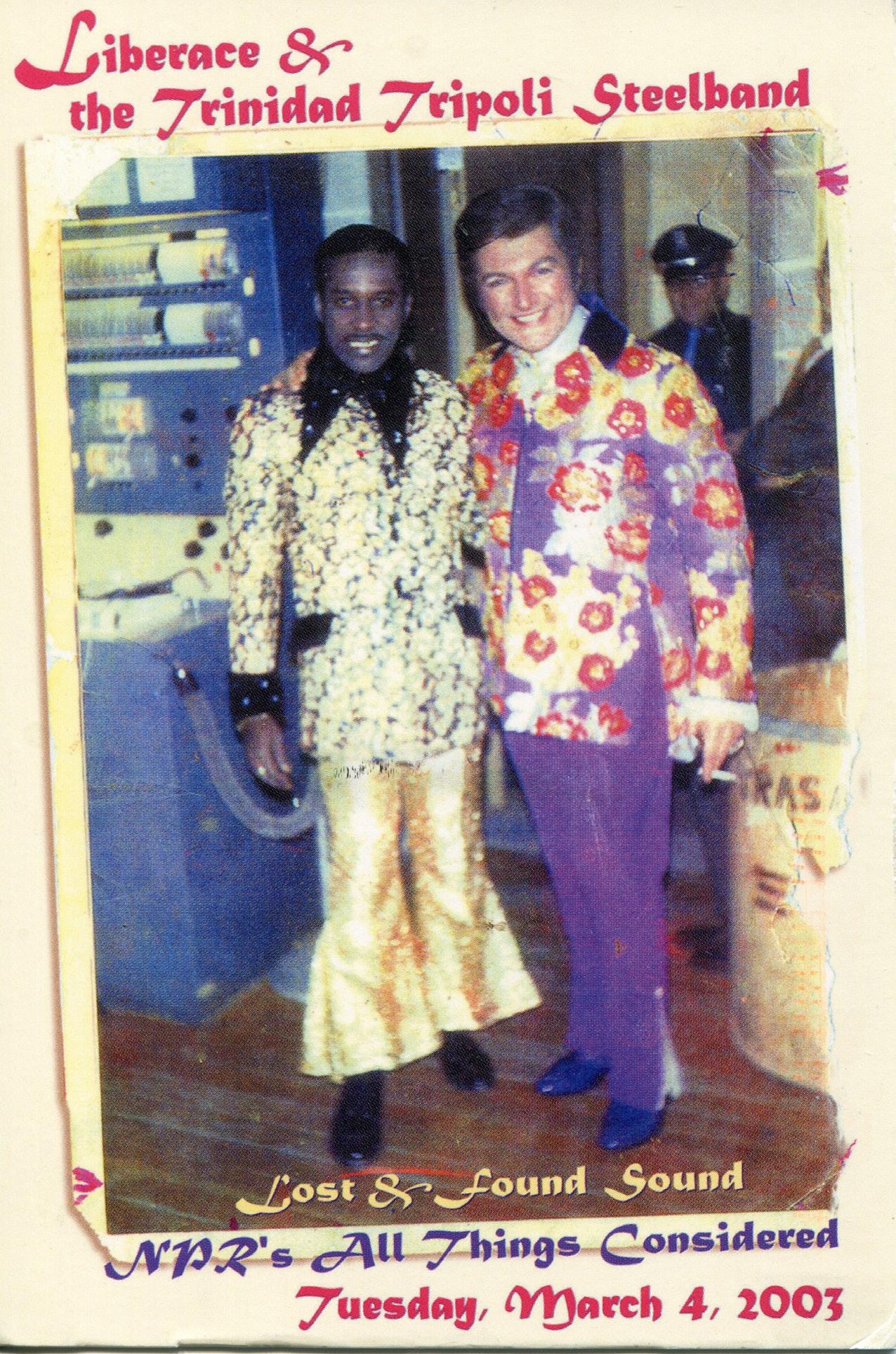
Advertisment for NPR’s All Things Considered featuring Hugh Borde, Liberace, and the Trinidad Tripoli Steelband
appearance, presentation, and professionalism, and venues included, for example, a week of appearance at the Louisiana State Fair in Shreveport with the Ice Capades.
Jim Boyce became the primary arranger for the new Tripoli, putting an emphasis on classical material. The band adapted to the tastes of times and one of the band’s most popular numbers on college campuses at the time was an innovative arrangement of the theme from the movie Shaft. Patrick
Following a performance at the Las Vegas Sahara during the 1972 Easter Seal Telethon, popular Italian tenor Sergio Franchi convinced Borde and the new Tripoli to join him on a extended tour performing at many of the same venues as the old Tripoli had with Liberace. Tripoli was once again a successful touring act, but by the end of 1974, an exhausted Borde left the band in North Carolina and returned to Trinidad, and once again this version of the band continued without him. A national gas shortage, however, stranded the band in Charlotte and Tripoli was so well received in North Carolina that, after returning to the United States, Borde decided to settle there and the band was based in Charlotte for several years.
In 1977, Borde relocated to Michigan where he would permanently settle and began to notice “[m]y children started playing and I saw how good they were.” Borde made the decision to remake Tripoli once again as a family steelband. Mike Kernahan, who had moved to Ann Arbor and succeeded Alan Gervais as the band’s tuner, then moved to Florida and formed a new band called the Twenty First Century Steelband in Miami. He continues to be an important builder/tuner traveling and tuning throughout the United States.
Borde was a devotee of traditional calypso and classics from Sparrow and Kitchener were a continuous staple of the band’s repertoire. When Chalkdust, Dr. Hollis Liverpool, was living in Michigan working on his doctorate, they would often perform together. Borde noted, “Chalkie actually would play guitar pan with the band!” Hugh’s daughter Bianca Borde often sang with the band. She appeared in Trinidad at the Professional calypso tent in 1977 as the Buzzing Bee. At the time, she was the youngest female calypso singer to reach to the Monarch finals and came in second in the Calypso Queen competition behind Calypso Rose.
Tripoli also adapted to changing times and repertoires, and the band has continued to work with former band members from Tripoli and Twenty-First Century Steelband as well as the late Cliff Alexis to shape and evolve. Hugh’s son Emile took a key role in reshaping the Tripoli sound. “I wanted to make the band smaller and update its sound. To be truthful, I’d rather play Top 40 songs than Beethoven’s Fifth Symphony, which is what the old band used to play. My father really resisted the change at first, but the whole band was family, and everybody knew that we’d hit around a good combination.” In later years, Hugh Borde’s ill health prevented his participation while Emile Borde has continued as a steelpan soloist and bandleader with a band called Tropical Connections and has completed a documentary film on his Tripoli recorded a series of albums during the 1990s and 2000s, and continued to tour on college campuses and state fairs among other venues. By 2008, they had appeared on 325 college and universities. Over the years, Tripoli has performed with countless artistic icons, including Barbara Mandrell, Aretha Franklin, Harry Belafonte, Chubby Checker, Sugar Minot, Jaco Pastorius, Charlie Pride, Max Roach, and Bob Marley’s Wailers among others.
Meanwhile, various events have brought attention to the band’s long history. In 2003, National Public Radio’s All Things Considered, aired a piece titled Liberace & the Trinidad Tripoli Steelband an extended audio piece by the Kitchen Sisters.
Davia Nelson of the Kitchen Sisters became fascinated with hearing Emile Borde play at a private party at her sister’s home and wanted to learn more about the history of the instrument and the band. In 2009, Van Dyke Parks reissued the 1971 Warner Brothers album he produced on his Banastan Records with a 28-minute documentary of Tripoli traveling on the road across America in the 1970s that not been previously released.
Trinidad Tripoli, Pan Pioneers across the Globe
Since the 1940s, the Trinidad Tripoli steelband in its many facets and configurations was a pioneering steeband in Trinidad and North America. Many former Tripoli steelband members have gone on to celebrated careers in steelpan. Courtney Leiba immigrated to Australia and formed the Calypso Pan-Tas-Tic Steelband and received a Certificate of Appreciation for promoting steelbands in Australia from Panz (Steelband Association of Australia and New Zealand), Casper Duranmt was master of the quads for Exodus Steel Orchestra, Harold Headley who recently retired from teaching steelpan at the Creative Arts Centre at UWI (he and his brother Kenrick together have been Panorama arrangers for Exodus and other bands), Jim Boyce and Donald Baptiste led steelbands in Charlotte, North Carolina, Tommy Crichlow leads the Pan Masters in Toronto, tunes for Canadian steelbands, and is a long time judge for Panorama in Trinidad.
The leader of Tripoli for over fifty years, Hugh Borde received several awards for his service to steelpan throughout his life. He was awarded the Hummingbird Bronze Medal by Trinidad and Tobago in 1971, awarded the Gold Medal of Merit by United States President Ronald Regan for his contribution in steelband in 1986, and he received a Sunshine award in 1995. He ranks with Ellie Mannette and Cliff Alexis among the most important Trinidad pioneers of the steel
Special thanks to the late Hugh Borde, Emile Borde, Clyde Borde, Kenrick Headley, Harold Headley, Michael Kernahan, Tommy Crichlow, Coutney Leiba, Jim Boyce, Casper Durant, Wilton DeBois, Davia Nelson, Mason Damrau and Kim Johnson
ABOUT THE AUTHORS
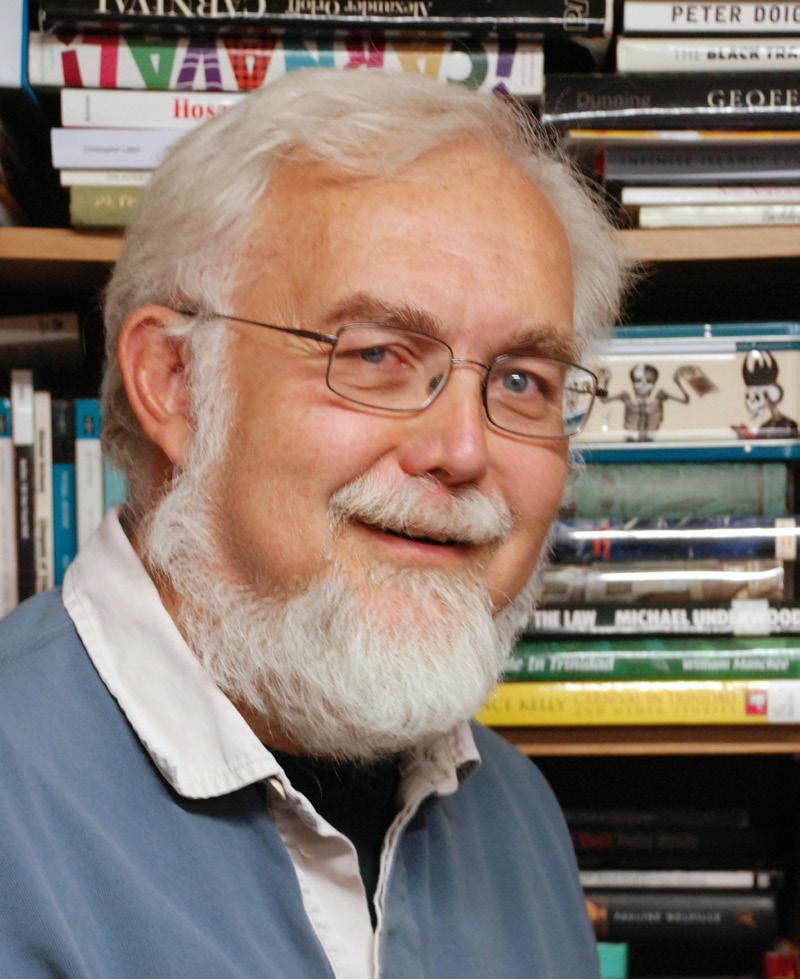
Ray Funk is a retired Alaskan judge and a Fulbright scholar who is passionately devoted to calypso, pan, and mas.
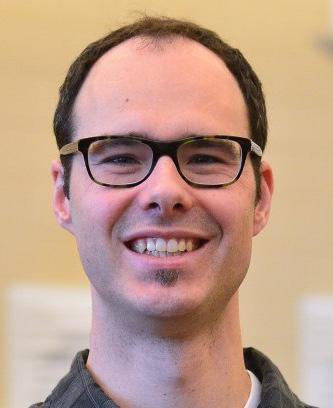
Andrew Martin, Ph.D., is Professor of Music at Inver Hills College where he teaches courses in music history, music analysis, percussion, and Caribbean studies. He is the author of the books Steelpan Ambassadors: The US Navy Steel Band 1957-1999 and Steelpan in Education: A History of the Northern Illinois University Steelband. Since 2011, Martin has written a semi-regular newspaper column “Pan Worldwide” in the Trinidad Guardian.






